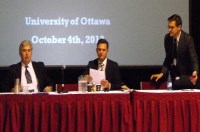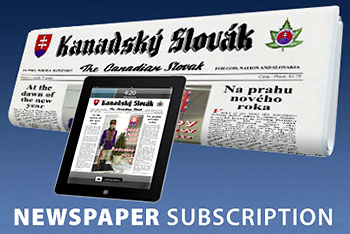International Scholarly Conference a Great Success
 On Friday and Saturday, October 4-5, 2013, the Chair in Slovak History and Culture at the University of Ottawa organized a major scholarly conference on "The Czech and Slovak Republics: Twenty Years of Independence, 1993-2013." Seventy-three individuals from all walks of life registered. It was opened by University of Ottawa Vice-President and Provost Christian Detellier, who mentioned that, as a Belgian, he could understand what the Czechs and Slovaks went through twenty years ago. His Excellency Milan Kollár, Ambassador of the Slovak Republic to Canada, then read the plenary address of the Honourable Jozef Moravčík, former Prime Minister of Slovakia, who could not attend. Among other things, Dr. Moravčík mentioned that, as a supporter of Slovak independence, twenty years later his "conscience was clear." By contrast, in the plenary address of the Honourable Petr Pithart, former Prime Minister of the Czech Republic, which was read by Czech chargé d'affaires Robert Tripes, because Dr. Pithart could also not attend, Pithart regretted the breakup of Czechoslovakia and, while admitting that "the dissolution was carried out legally," because there was no referendum, it was carried out "without any legitimacy."
On Friday and Saturday, October 4-5, 2013, the Chair in Slovak History and Culture at the University of Ottawa organized a major scholarly conference on "The Czech and Slovak Republics: Twenty Years of Independence, 1993-2013." Seventy-three individuals from all walks of life registered. It was opened by University of Ottawa Vice-President and Provost Christian Detellier, who mentioned that, as a Belgian, he could understand what the Czechs and Slovaks went through twenty years ago. His Excellency Milan Kollár, Ambassador of the Slovak Republic to Canada, then read the plenary address of the Honourable Jozef Moravčík, former Prime Minister of Slovakia, who could not attend. Among other things, Dr. Moravčík mentioned that, as a supporter of Slovak independence, twenty years later his "conscience was clear." By contrast, in the plenary address of the Honourable Petr Pithart, former Prime Minister of the Czech Republic, which was read by Czech chargé d'affaires Robert Tripes, because Dr. Pithart could also not attend, Pithart regretted the breakup of Czechoslovakia and, while admitting that "the dissolution was carried out legally," because there was no referendum, it was carried out "without any legitimacy."
After the plenary addresses, scholars from both the Czech and Slovak Republics looked at the breakup of the former Czechoslovakia and its consequences. The Czech perspective was given by Dr. Jan Rychlík of Charles University in Prague, with a commentary by Dr. Michael Kraus of Middlebury College in Vermont. The Slovak perspective was read by Dr. Adam Hudek on behalf of Dr. Jozef Žatkuliak, both from the Historical Institute of the Slovak Academy of Science in Bratislava. The commentary was given by Dr. Stanislav Kirschbaum of York University in Toronto. All four scholars agreed that relations between Czechs and Slovaks had reached an impasse by 1992 and the only solution was a friendly divorce of the two republics.
The next panel discussed political developments in the Czech and Slovak Republics in the last twenty years. Dr. Juraj Hocman, of the Hochschule Goethe Uni in Bratislava, outlined how Slovak politics developed from the authoritarian rule of Vladimír Mečiar in the 1990's through the right-wing governments of Mikuláš Dzurinda and back to the left-wing politics of Robert Fico in the 2000's. Professor Kevin Deegan Krause of Wayne State University in Detroit commented that, in spite of the plethora of political parties that have appeared and disappeared in Slovakia over the last twenty years, voting has been rather consistent along Roman Catholic, Magyar, left-wing and right-wing lines.
Dr. Adela Gjuričová, of the Institute of Contemporary History at the Czech Academy of Science in Prague, then outlined the course of Czech politics over the last two decades. She pointed out that recent Czech politics has been dominated by three men: Václav Havel, Václav Klaus and Miloš Zeman, who respectively espoused a common humanity, right-wing economics and left-wing solutions to society's problems. Interestingly, all three eventually became Presidents of the Czech Republic. Carol Skalnik Leff, of the University of Illinois, concurred.
On the second day of the conference, which was opened by Dean Antoni Lewkowicz of the Faculty of Arts, scholars discussed economic and social developments in the two republics.
Adam Hudek read colleague Miroslav Londák's paper on economic developments in Slovakia over the last twenty years. Londák pointed out that, despite Slovakia having lagged behind the Czech Republic in industrialization after World War II, it rapidly caught up in the last two decades and has almost reached the same level of development as the Czech Republic. John Gould of Colorado College agreed. Martin Pospisil of the OECD in Paris then presented macro and micro-economic developments in the Czech Republic over the last two decades. Sharon Fisher of Global Insight in Washington, D.C. reminded the audience that most observers of the Czech and Slovak divorce of 1993 predicted that Slovakia would suffer much more from the breakup than the Czech Republic. Subsequent developments proved these observers wrong.
The final presentations focussed on social developments in the Czech and Slovak Republics. Martin Bútora, a sociologist who founded the Institute for Public Opinion Research in Slovakia, presented a paper co-written by his sociologist wife Zora, which illustrated Slovak satisfaction or dissatisfaction with various elements of society. They noted that Slovaks are most dissatisfied with the state of their judicial system. Sharon Wolchik of George Washington University agreed and suggested some additional areas for research. Oldřich Tůma, of the Czech Academy of Science then spoke on social developments in the Czech Republic over the last two decades. He pointed out that, in spite of their relative prosperity, most citizens of the Czech Republic are in a "foul mood," which is hard to explain. James W. Peterson of Valdosta State University, agreed and suggested some reasons for this foul mood.
In his concluding remarks, the conference organizer M. Mark Stolarik expressed satisfaction with the conference. He was especially proud that, on the 20th anniversary of the "Velvet Divorce" of the former Czechoslovakia, he had brought together some of the leading scholars from the Czech and Slovak Republics with their counterparts in North America. Stolarik then pointed out that, because the Slovaks now had their own, independent, republic, the Czechs at last had to treat them as equals. Stolarik then urged the presenters and commentators to revise their papers and he would seek to publish the Proceedings next year.
Stolarik also expressed his thanks to all the individuals and organizations who had made the conference possible. He singled out the Embassies of the Czech and Slovak Republics in Ottawa for having co-sponsored the conference. Stolarik also thanked members of the Slovak community in North America, whether individuals or organizations, who made financial contributions to cover the costs of the conference. Even though these Slovak communities are not wealthy, they are very generous.
Text: M. Mark Stolarik, Photos: Jan George Frajkor




